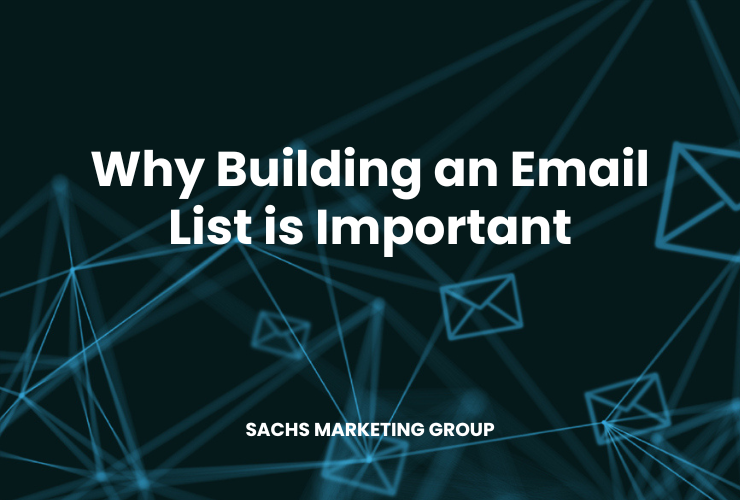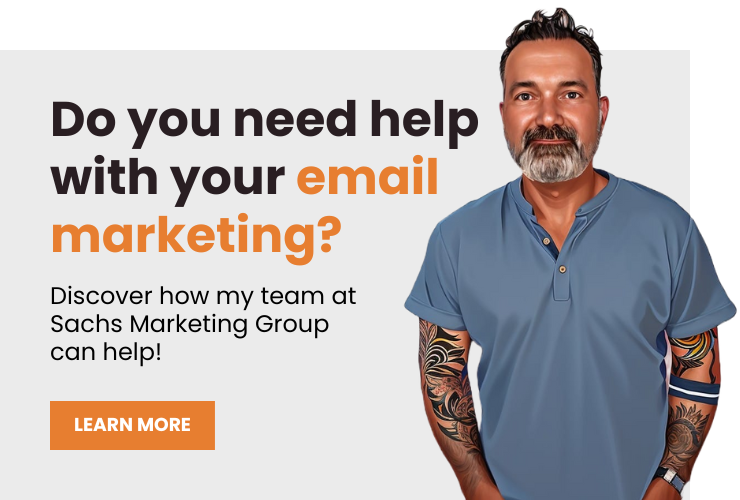Building an email list is a crucial aspect of digital marketing. It offers direct communication with your audience, a higher return on investment compared to other marketing channels, personalization opportunities, audience segmentation, and can establish trust with your customers.
Building an email list may feel like a daunting task, particularly if your business is new or you are trying to grow your digital presence.
However, the fear of starting from scratch should not deter you because the potential payoff is significant. The power of having direct communication with a dedicated audience who are interested in your product or service cannot be underestimated.
By building an email list, you’re investing in a lifelong business asset that boosts customer loyalty, enhances your marketing ROI, and facilitates a personalized customer journey, leading to increased sales and business growth.
In this article, you’ll discover why building an email list is important.
Overview
What is an Email List?
An email list is a collection of email addresses that a business can leverage to send informative and promotional content.
These addresses often belong to customers, prospects, or anyone who has shown interest in your brand or service. Email lists are a fundamental element of email marketing, providing a direct line of communication with people who have willingly subscribed to receive your content.
Why Building an Email List is Important
Building an email list is a crucial aspect of a successful marketing strategy. It allows businesses to maintain a direct and personalized connection with their customers, facilitating better engagement and a higher return on investment.
Here’s why building an email list is important in 2023.
1. Your Email List is a Lifelong Business Asset
Just as real estate is an asset in the physical world, an email list is a digital asset that can provide ongoing value for your business. It’s an investment that, with careful cultivation, grows over time. This list represents a group of individuals who have shown interest in your offerings and given you permission to contact them. They’re your audience, your community, and potentially, your loyal customers.
For example, let’s take an online boutique that’s been nurturing its email list for several years. The boutique can leverage this list to announce new collections, offer special discounts, and share exclusive content. Over time, this cultivated relationship can turn subscribers into repeat customers who not only consistently contribute to the boutique’s revenue but also become advocates for the brand, sharing their love for the boutique’s offerings with friends and family.
2. You Own Your Email List
Unlike social media followers, you truly own your email list. It’s not subject to changes in algorithms or platform policies, which can limit your reach. This ownership provides control over your business communication, making your email list a reliable and independent channel for connecting with your audience.
Imagine a local bookstore that maintains a robust email list. If a social media platform they use changes its algorithm, making it harder for the bookstore’s posts to reach their followers, the bookstore’s communication strategy wouldn’t be severely impacted. They still have their email list. They can still reach out to their audience directly, announcing new arrivals, sharing book recommendations, and inviting subscribers to author events. The bookstore owns its email list, ensuring its connection to its customers remains strong regardless of external changes.
3. Your Email List Provides Direct Connection
An email list allows for a direct connection to your customers and prospects, creating a one-on-one conversation that isn’t possible with mass media advertising or crowded social media platforms. This direct line of communication can foster a stronger relationship with your audience.
Consider a specialty coffee shop that uses its email list to connect with customers. They could send personalized coffee recommendations based on each subscriber’s past purchases. Or, they might share behind-the-scenes stories about their coffee sourcing and brewing techniques, fostering a sense of connection and appreciation. These direct, personal touches help build a loyal community around the coffee shop’s brand, strengthening customer relationships.
4. Your Message is More Likely to Be Seen
With the ever-growing noise on social media and other digital platforms, getting your message seen can be an uphill battle. This is where email marketing shines. When you send an email, it lands directly in your subscriber’s inbox, unobstructed by any algorithms or competing messages. This increases the likelihood of your message being seen, and if your subject line is compelling, being opened as well.
For example, consider a local bakery releasing a limited-time specialty cake. An announcement posted on social media could easily be lost in the sea of posts, but an email showcasing the new dessert, complete with a tantalizing picture and description, is far more likely to capture the attention of subscribers. Moreover, with the possibility to personalize the subject line (e.g., “John, our new Chocolate Decadence Cake awaits you!”), the chance of the email being opened and read increases dramatically.
5. Email Marketing has a Higher ROI than Other Marketing Channels
When it comes to return on investment (ROI), email marketing often outperforms other marketing channels. It’s cost-effective, both in terms of setup and management, and offers direct access to prospects and customers who have already expressed interest in your brand. Furthermore, the ability to segment and personalize emails makes it easier to drive conversions.
Suppose a travel agency is seeking to boost bookings for a specific destination. They could utilize their email list to send a targeted campaign, offering an exclusive discount for that location to subscribers who have previously shown interest in similar destinations. This direct, tailored approach can result in a higher conversion rate and ultimately a significant ROI, making email marketing a powerful tool in any business’s digital marketing arsenal.
6. An Email Can Be Personalized
Personalization is crucial to engaging with your audience, and emails provide a great platform for this. Unlike a social media post or an advertisement, an email can be tailored to address the recipient directly, giving it a personal touch. This level of personalization can significantly improve open rates and engagement.
Imagine a fitness center that offers a variety of classes from yoga to high-intensity interval training (HIIT). They could use their email list to send personalized workout suggestions to their subscribers based on their interests and past attendance. By sending an email that addresses the recipient by name and offers recommendations tailored to their fitness preferences (“Sarah, boost your strength and flexibility with our Power Yoga class this week!”), the fitness center not only adds a personal touch but also demonstrates its commitment to helping its clients achieve their fitness goals. This fosters a connection with the client, making them feel valued and appreciated, which in turn increases engagement and loyalty.
7. It Can Help Build Trust
One of the most significant advantages of email marketing is its ability to build and nurture trust with your audience. Regular, relevant, and valuable content delivered straight to your subscribers’ inboxes can help establish your brand as a reliable source of information in your field. Over time, this familiarity builds trust and credibility, enhancing the likelihood of your subscribers turning into customers.
For example, a financial advisor could use their email list to regularly distribute helpful tips and articles on managing personal finances, retirement planning, or investment strategies. By consistently providing valuable content, the advisor builds a reputation as a trusted expert in the field, increasing the chance that when subscribers need financial services, they’ll turn to the advisor they’ve come to know and trust.
8. Your Email Subscribers Are Already Interested
One of the greatest strengths of an email list is that the individuals on it have already demonstrated an interest in your brand by opting in. This means your marketing efforts are directed towards an audience that has a pre-existing level of interest, making them more likely to engage with your emails and potentially convert into customers.
Consider a clothing boutique offering a loyalty program. Customers who sign up for the program are clearly interested in the boutique’s products. By using email to notify these loyal customers about new collections, exclusive sales, or personalized style recommendations, the boutique can effectively drive engagement and sales, knowing their email recipients are already primed and interested.
9. You Can Segment Your Audience
Email lists are not just a homogenous group of people; they can be divided or segmented based on various criteria, like purchasing behavior, interests, or demographics. This allows for targeted and personalized marketing, which can dramatically increase engagement and conversion rates.
Take an online bookstore, for instance. They could segment their email list into different groups, such as fiction lovers, non-fiction enthusiasts, or fans of certain genres. The bookstore can then send tailored recommendations to each group, ensuring subscribers receive information most relevant to their reading preferences. This targeted approach makes subscribers feel understood and valued, fostering a deeper connection with the brand, and increasing the likelihood of future purchases.
10. You Can Create Email Sequences
One of the many advantages of email marketing is the ability to create email sequences, a series of automated emails that are sent out based on certain triggers or timelines. These sequences can nurture leads, onboard new customers, recover abandoned carts, and even encourage upsells or cross-sells. They are powerful tools for keeping your audience engaged and driving them towards taking desired actions.
For example, an e-commerce clothing store could set up an email sequence for first-time purchasers. The first email could be a welcome message with a discount code, followed by a series of emails featuring styling tips, best-sellers, or introductions to different product lines. Over time, this sequence not only enhances customer experience but also promotes repeat purchases, helping to increase the store’s overall sales and customer loyalty.
11. You Can Automate It
Automation is a game-changer in email marketing. With the right tools, you can set up your email campaigns to run automatically, saving you time while ensuring consistent communication with your audience. Whether it’s a welcome series, a promotional campaign, or a regular newsletter, once set up, these campaigns can run in the background while you focus on other aspects of your business.
Consider a software company that offers a free trial of their product. They could automate a sequence of emails that guides the trial users through the features of the product over a certain period. The first email could introduce the main features, subsequent emails could provide tips and tricks, and the final email could offer a discount for upgrading to the full version. This automated sequence keeps users engaged, increases product adoption, and potentially drives conversions, all with minimal manual work from the business.
What You Need to Get Started
Building an email list begins with the right tools and strategies.
First, you’ll need an email marketing platform, which will allow you to collect email addresses, send emails, and track your performance.
A few email marketing platforms to consider:
- MailChimp
- ActiveCampaign
- Constant Contact
- ConvertKit
You’ll also need a website or a landing page where you can host a signup form to collect email addresses.
Be sure to include a clear and compelling call-to-action (CTA) that encourages visitors to subscribe. Additionally, understanding the basics of email marketing, including laws like the CAN-SPAM Act, which sets the rules for commercial email and establishes requirements for commercial messages, is essential.
Developing a basic email marketing strategy is also crucial to ensure that your emails are targeted, engaging, and effective.
How to Attract Subscribers
Attracting subscribers to your email list requires a clear value proposition and a consistent communication strategy.
Offer your audience something of value in exchange for their email address – this could be exclusive content, a discount code, or early access to your products or services. Moreover, make it easy for people to subscribe. Your email signup form should be easily visible on your website, and the process to sign up should be straightforward.
Regularly promoting your email list on your website, blog, and social media channels can also help attract new subscribers. Additionally, maintaining a consistent email schedule that provides valuable content will keep your subscribers engaged and less likely to unsubscribe.
Hire an Email Marketing Expert
Email marketing may seem straightforward, but it involves many moving parts – from crafting compelling copy and designing attractive layouts to segmenting your list and analyzing metrics.
If you lack the time or expertise to manage it all, consider hiring a full-service digital marketing agency that provides email marketing services. An expert can help you set up your email marketing platform, develop a strategy that aligns with your business goals, create engaging content, and monitor your campaigns’ performance.
They can also help you navigate the nuances of email marketing laws, ensuring your campaigns are compliant. Investing in professional email marketing services can save you time, enhance your brand’s image, and ultimately drive better results.
FAQs About Building an Email List
We work with many business owners interested in the potential of email marketing, so we hear a lot of questions.
Here are some of the most frequently asked questions about building an email list.
What is the power of an email list?
The power of an email list lies in its ability to facilitate direct communication with a self-selected audience, enabling personalized marketing, improved engagement, and higher conversion rates.
Do you really need an email list?
Yes, an email list is a valuable tool for maintaining and nurturing relationships with your audience, driving engagement, and promoting your products or services.
Is an email list still effective?
Yes, despite the rise of social media and other communication channels, email remains one of the most effective marketing tools, often boasting a higher ROI than other channels.
What are email lists used for?
Email lists are used for sending subscribers informative and promotional content, such as newsletters, product updates, discounts, and more.
How do you grow a mailing list?
Grow a mailing list by providing value to potential subscribers, utilizing a clear call-to-action, offering incentives for signing up, and promoting your mailing list across your website and other marketing channels.
How often should you email your list?
The frequency of emails can vary based on your audience’s preferences and the nature of your content. However, maintaining a consistent schedule that doesn’t overwhelm your subscribers is key. Many businesses opt for weekly or bi-weekly emails.
Need Help Building Your Email List?
Looking to grow your email list but unsure where to start? Sachs Marketing Group can help.
Our team of digital marketing experts can assist in strategizing, building, and nurturing your email list to create meaningful relationships with your audience and drive business growth.
Contact us today to learn how we can help you get started and take your email list to the next level.
Conclusion
Building an email list is a vital step in your marketing strategy. It provides a direct line of communication with your audience, allowing you to engage with them on a personal level, segment your messages for increased relevance, and build trust over time.
Despite the growth of other digital marketing tactics, email marketing continues to offer a high ROI, making the task of building a strong, active email list one of the most important objectives for your business. Whether you’re starting from scratch or looking to enhance your existing strategy, the importance of an email list cannot be overstated.
Contact us today to get the conversation started!













